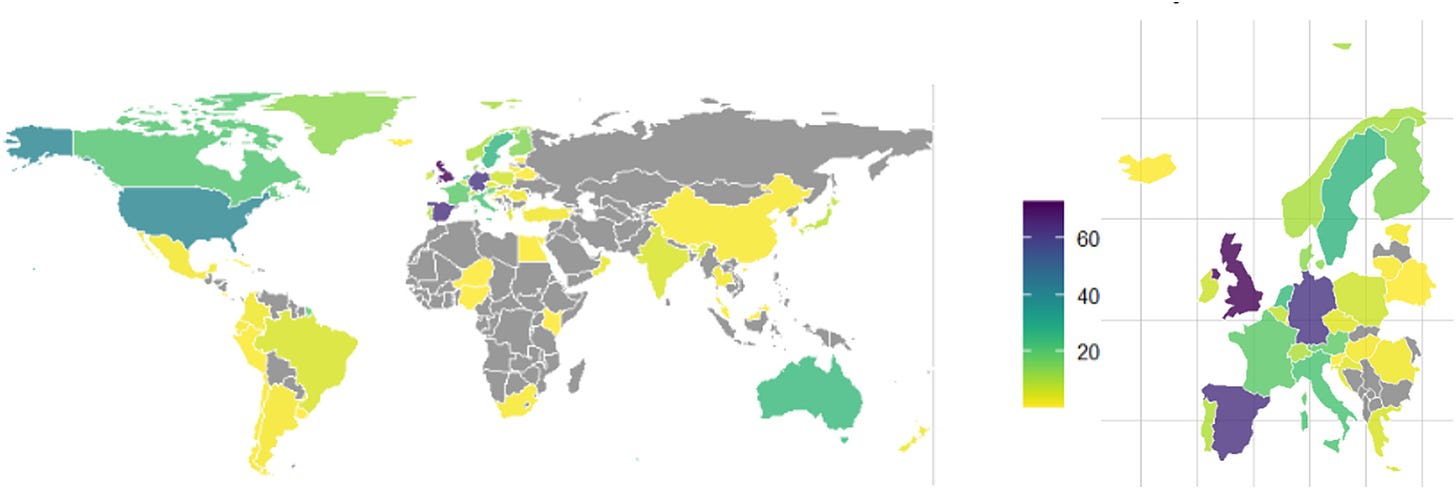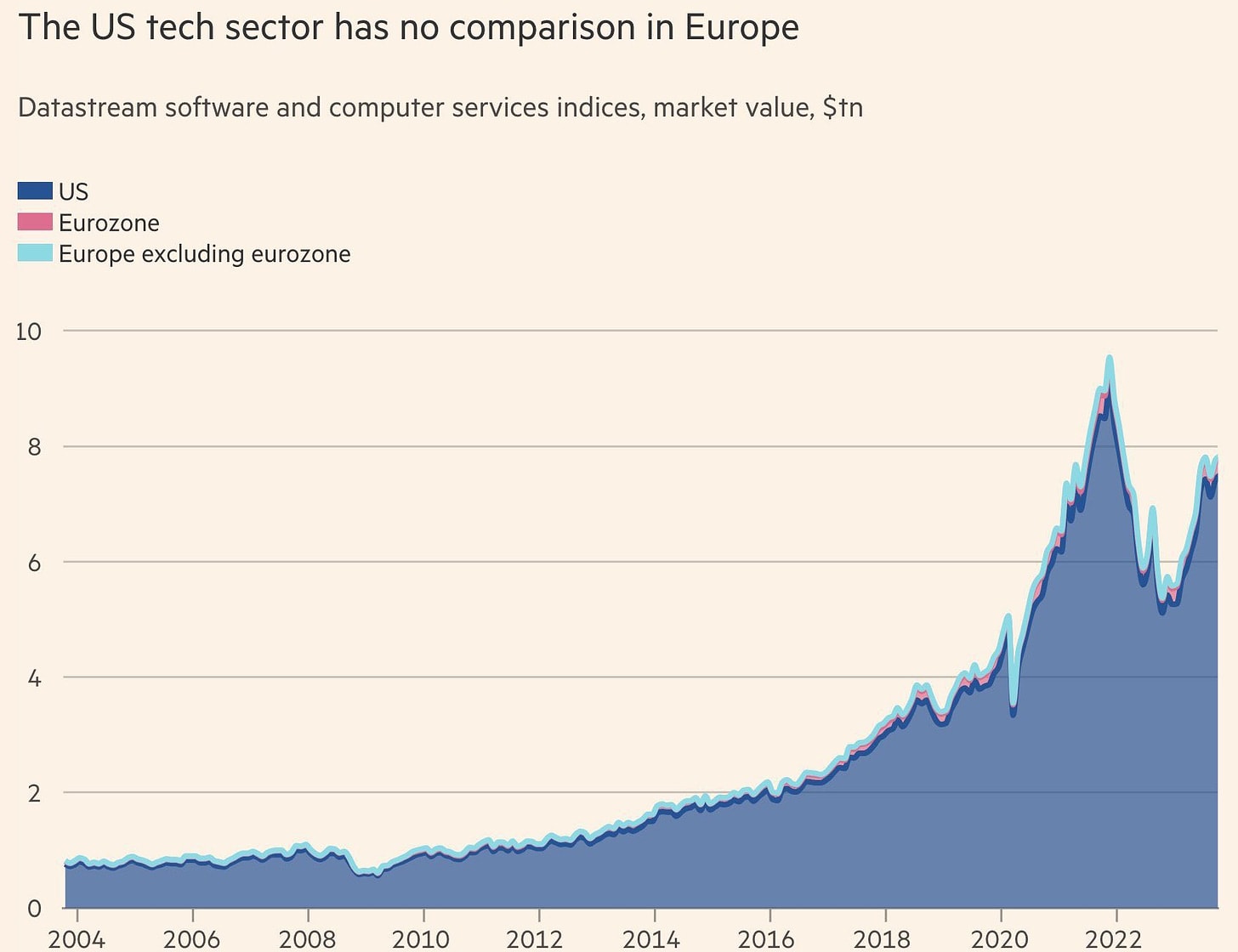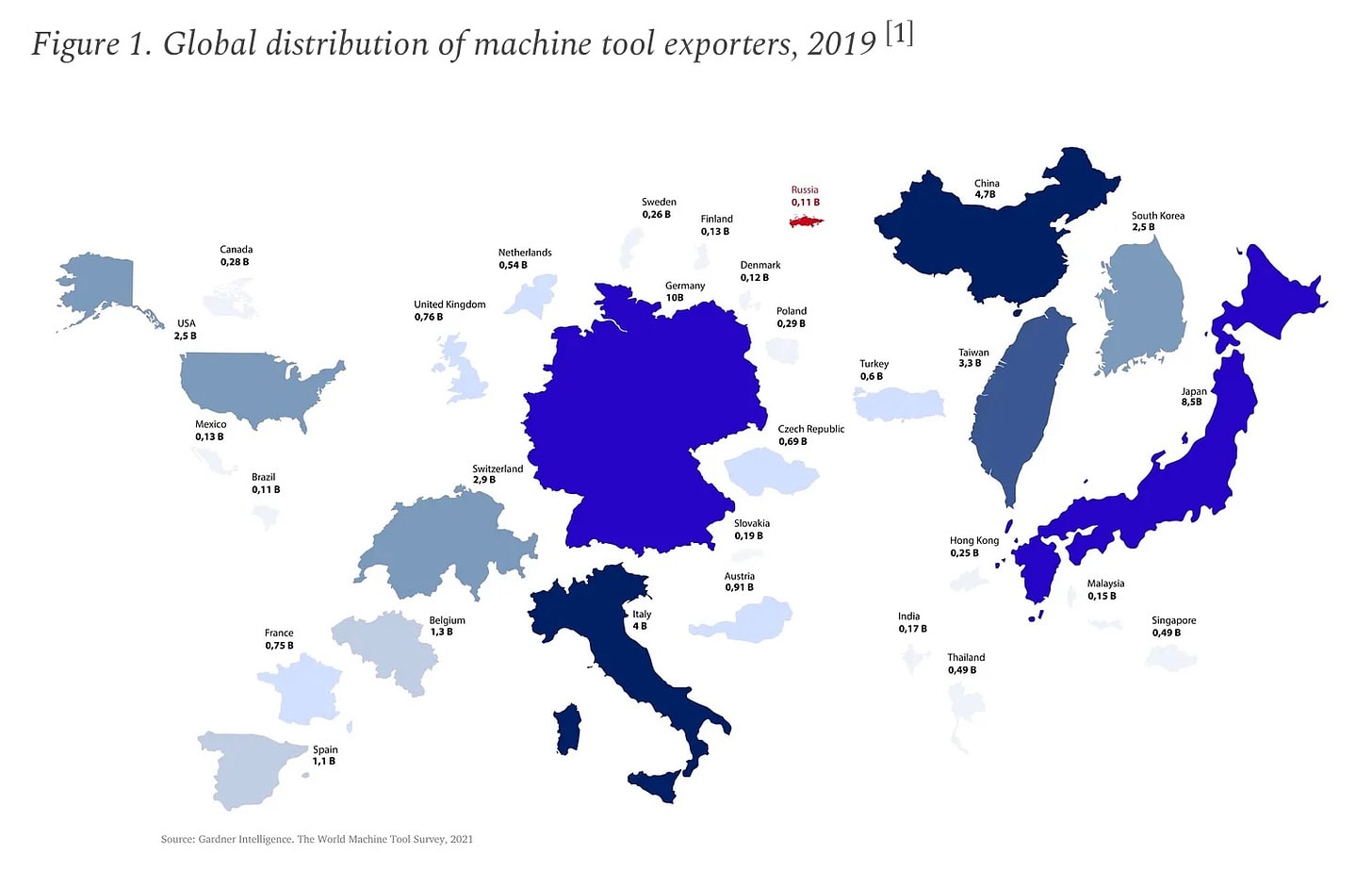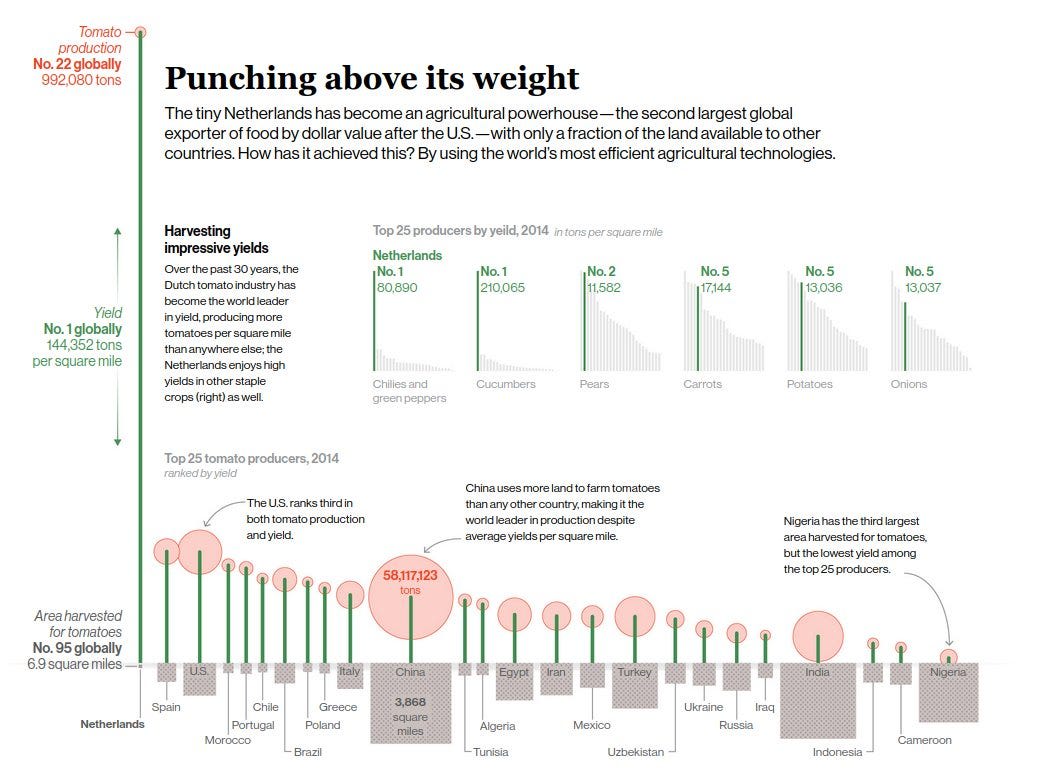European Progress Conference
post by Martin Sustrik (sustrik) · 2024-10-06T11:10:03.819Z · LW · GW · 11 commentsContents
12 comments
This is a crosspost from https://250bpm.substack.com/p/european-progress-conference
Europe has become known as a hub of degrowth.
Where are the authors of degrowth papers from?
European parliament even hosted a degrowth conference. Ursula von der Leyen addressed the participants and took a conciliatory (although still a pro-growth) stance.
This stuff is scary: I've seen degrowthers going so far as proposing to take lessons from Cuban "urban agriculture", referring to the time when people farmed any available plot of land to get any food at all (this may be familiar to Eastern Europeans who grew potatoes at their dachas in 1990's) and allegedly ate animals in the zoo.
To counter the stigma, it's past the time for Europe to hold a pro-growth counterconference. A conference similar to upcoming Roots of Progress conference, but, given the European specifics, less focused on the theory and and more on just bringing the progress-friendly forces of the continent, across the geopolitical and language divides, into the same room.
Although the situation in Europe may seem bad, especially when comparing it to the US, it's not all doom and gloom.
Europe has great infrastructure, good education, promising research, high human capital (sadly being exported en masse to the US at the moment), it contains the world's largest free market zone, and generally, it has almost all the prerequisites for sustained growth.
To give an example from my own field, software, Europe has slept through the software revolution and realized almost no gains from it.
Yet, at the same time, when you look at the open source software, a substantial part of it comes from Europe. The web was developed by a Briton in Switzerland. Linux was concieved in Finland. Python programming language hails from Netherlands, MySQL from Sweden. My own little contribution to the ecosystem, ZeroMQ, was mostly developed in a basement room in Slovakia. (Yay for central-eastern Europe, the region of crazy politics but a nice growth record!)
Europe hosts the biggest open source conferences, such as FOSDEM (Belgium, 10000 attendees) and CCC (Germany, 17000 attendees).
Moving away from software, Europe has strong pharma (Britain, Switzerland and lately Denmark; check the blogs of Ruxandra Teslo or Alex Telford), Germany and the adjacent regions (northern Italy, Switzerland, Belgium) are still the biggest producers of machine tooling and the only real rival there is the entire east asian cluster.
France makes 70% of its electricity from nuclear and builds ITER, the largest experimental fusion reactor so far. France and Switzland are also the home of CERN.
And while America a facing a longshoreman strike, with port workers demanding that US ports are never automated, the largest port in Europe, Rotterdam, was fully robotized a decade ago.
Netherlands, a tiny country, is the world's second largest food exporter, only behind the US. And it's not just high-value stuff (flowers) either. Look at the crazy Dutch tomato yields, many times higher that the next best country (Spain). If you are fan of Norman Borlaug and the green revolution, visit Netherlands to find out what's being cooked today.
And imagine combining the Dutch agricultural research (Wageningen University is ranked as the No. 1 in agricultural sciences) with the gentech experience being accumulated around European big pharma and with the global bread basket that is Ukraine! Yes, there's a war there, but it will eventually end and the country will need a good way to recover economically. The possibilities are mind-boggling.
Estonia, the home of Skype, is a world leader in e-government and even exporting their governance system via e-residency. As far as I understand, you can even marry online now. (The divorce still has to be done in person though.)
Finland is known for its efficient educational system, Norwegian handling of their oil riches may provide a lesson for other resource-curse-stricken countries.
Obligatory honorary mention of course goes to Dutch company ASML, an indispensable part of the global high-end semiconductor-producing chain.
Europe is also big in hospitality industry, to the point where people are actively protesting the inflow of tourists. Tourism may not be the first to come to mind when talking about progress, but hey, I've just read a book about how Switzerland jump-started its hospitality industry in XIX. century (mostly aimed at rich Englishmen - you may recall that Mary Shelley's Frankenstein was written in Switzerland!) with all the crazy stuff like whey spas and a plan to build a staircase inside Matterhorn, all the way to the top.
Matterhorn
When it comes to politics, Mario Draghi, with his recent report on European competitiveness proves that even eurocrats are not completely impervious to pro-growth ideas. Luis Garicano, an economist from Spain and a former member of European Parliament, has recently started a nice Europe-oriented pro-progress blog. There are also authors of the "Foundations: Why Britain has stagnated" report and even Dominic Cummings, like his politics or not, is a staunch pro-growth advocate.
Last but not least, Patrick Collison, who was, together with Tyler Cowen, the first to call for the field of progress studies to be established hails from Ireland.
Bringing all these people together may bring the badly needed first impulse to set the European economy back on the pro-growth path.
11 comments
Comments sorted by top scores.
comment by Sherrinford · 2024-10-07T10:51:24.586Z · LW(p) · GW(p)
Europe has become known as a hub of degrowth.
It is unclear what this claims is supposed to mean. The characters "europ" do not appear in the Conclusions of the linked article. It is not clear what the fact that some authors of papers covering "degrowth" come from Europe, whatever that means in the specific paper, is supposed to prove.
comment by AnthonyC · 2024-10-07T13:45:26.960Z · LW(p) · GW(p)
I think there's a lot of good analysis here, and I agree that Europe in general seems mixed at best about growth and innovation. Many cities and some countries are doing great things, but the EU likes to slow everything down, even the things they themselves mandate need to happen on a deadline. As an American, I care about the well being of Europeans, but really, that's their own deal. They're well-off enough to survive their own mistakes and change course if they want.
I care more about how de-growth politics in Europe affects the development of the world as a whole, and in that regard, I'm a bit less concerned (though not unconcerned). As you noted, there's a lot of good technology and software being developed in Europe. But, it seems to me that to a greater extent than in the US, the money isn't being captured by European GDP, and in many cases the projects using such technology that enable further growth are happening outside European borders.
In other words: there's a potential timeline where ITER goes great and the result is that KEPCO and TEPCO and SP Group higher Chinese and Indian ITER partners to build the first commercial plants in Korea and Japan and Singapore (whose current best options include things like building undersea HVDC cables to Australia) to prove out the technology, which lets them get costs down enough to decarbonize China and India and Indonesia and the rest of APAC. Europe, maybe, follows 20-30 years later to finish whatever is left to be done after pushing wind and solar as far as they can manage. Probably using lots of American and Canadian technology for the wind and solar and energy storage, as well as their own, of course. This is not the best timeline for fusion, but it's a very good one.
I once joked with a (Dutch) coworker that the traditional American approach to stagnation is to go build a new city. We've been going West and South for 400 years. The traditional European approach is to wait for someone or something to raze your city and then rebuild with newer stuff and a better plan. They've been doing that for 1600 years. Europe today has pretty much successfully ended the specter of being razed, and the US has run out of West and South, but neither Europe nor America really knows how to renew itself in place. We just started later and with a few useful differences in ideals.
Replies from: sustrik↑ comment by Martin Sustrik (sustrik) · 2024-10-07T16:04:44.298Z · LW(p) · GW(p)
b> Many cities and some countries are doing great things, but the EU likes to slow everything down
If it was that simple, its a whole mess with both EU and member states implicated:
In 2008, the EU established a European Institute of Innovation and Technology (EIT) with the aim of replicating the success of institutions like MIT. If you have not heard of it, it is not your fault. The effort went badly from the start, as EU countries couldn't agree on where to put it. So, in true EU fashion, governments compromised by breaking it into pieces and spreading it across multiple cities. So much for agglomeration effects.
But, it seems to me that to a greater extent than in the US, the money isn't being captured by European GDP, and in many cases the projects using such technology that enable further growth are happening outside European borders.
Case in point: Germany subsidizing early development of solar. But there is longer any production of solar panels in Germany.
The traditional European approach is to wait for someone or something to raze your city and then rebuild with newer stuff and a better plan.
I think I've even seen a study about areas bombed out during WWII performing better economically today.
Replies from: AnthonyC↑ comment by AnthonyC · 2024-10-07T16:43:59.885Z · LW(p) · GW(p)
If it was that simple, its a whole mess with both EU and member states implicated:
Of course, I was definitely oversimplifying for my comment!
I think I've even seen a study about areas bombed out during WWII performing better economically today.
One good example is the collapse of the steel industry in the US, hastened by Europe and Japan using newer and better equipment. I haven't looked into direct comparisons between cities in Europe, that would be interesting.
comment by Sherrinford · 2024-10-07T11:22:18.627Z · LW(p) · GW(p)
are not completely impervious to pro-growth ideas
Depicting "eurocrats" as mostly impervious to "pro-growth ideas" seems like a strawman.
Replies from: sustrik↑ comment by Martin Sustrik (sustrik) · 2024-10-07T12:25:09.549Z · LW(p) · GW(p)
Sorry, this is an internal European discourse about the European economy slowing down compared to the US. The "eurocrat" wording is a bit tongue-in-cheek thing. The reality is more about the coordination problems associated with scaling down the regulation. Compare the news like this: "Macron Warns EU ‘Could Die’ Within 3 Years Due to Overregulation, Welfare Burden, Underinvestment" https://www.theepochtimes.com/world/macron-warns-eu-could-die-within-3-years-due-to-overregulation-social-welfare-burden-underinvestment-5734718?rs=SHRNCMMW
Replies from: Sherrinford↑ comment by Sherrinford · 2024-10-07T13:13:05.009Z · LW(p) · GW(p)
I know the internal European discourse, which is why I think depicting politicians in Europe as being mostly impervious to "pro-growth ideas" seems like a strawman. It is mainstream in the EU to try to find ways for higher economic growth rates. Everybody is talking about deregulation, but there are very different ideas what kind of policies would lead to higher growth rates.
Replies from: sustrik↑ comment by Martin Sustrik (sustrik) · 2024-10-07T13:23:38.796Z · LW(p) · GW(p)
Agreed. But the popular narrative is that all the EU bureaucrats want is to regulate and then regulate some more. The sentence in question is supposed to say that it is not necessarily so, in accord with what you are saying.
Replies from: Sherrinford↑ comment by Sherrinford · 2024-10-07T13:40:17.196Z · LW(p) · GW(p)
It is an interesting question how justified this stereotype is, given that many regulations aim at creating a single market and reducing trade barriers.
Comparing EU growth to the US is hard for different reasons, for instance demography but also the decarbonization efforts of the EU.
comment by Sherrinford · 2024-10-07T11:08:51.925Z · LW(p) · GW(p)
This stuff is scary: I've seen degrowthers
It is unclear how strongly related such degrowthers are to the beyond-growth conference people used as an example in the previous sentence.
comment by Sherrinford · 2024-10-07T11:07:12.239Z · LW(p) · GW(p)
European parliament even hosted a degrowth conference.
The linked abstract does not contain the word "degrowth". The title is "Beyond growth: Pathways towards sustainable prosperity in the EU", the abstract is relatively unclear but - among other things - seems to criticize GDP as a measure, and talk positively of "research and innovation". The executive summary of the study that can be found there seems to talk positively of delivering "greener and more sustainable growth through technological or social innovations" and of "decoupling of economic growth from increased emissions of carbon dioxide". So in general, this seems to be about limiting the growth of the usage of natural resources in order to stay within sustainable levels.




